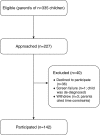Adherence Determinants in Cystic Fibrosis: Cluster Analysis of Parental Psychosocial, Religious, and/or Spiritual Factors
- PMID: 25803407
- PMCID: PMC4590021
- DOI: 10.1513/AnnalsATS.201408-379OC
Adherence Determinants in Cystic Fibrosis: Cluster Analysis of Parental Psychosocial, Religious, and/or Spiritual Factors
Abstract
Rationale: Cystic fibrosis is a progressive disease requiring a complex, time-consuming treatment regimen. Nonadherence may contribute to an acceleration of the disease process. Spirituality influences some parental healthcare behaviors and medical decision-making.
Objectives: We hypothesized that parents of children with cystic fibrosis, when classified into groups based on adherence rates, would share certain psychosocial and religious and/or spiritual variables distinguishing them from other adherence groups.
Methods: We conducted a multisite, prospective, observational study focused on parents of children younger than 13 years old at two cystic fibrosis center sites (Site 1, n= 83; Site 2, n = 59). Religious and/or spiritual constructs, depression, and marital adjustment were measured by using previously validated questionnaires. Determinants of adherence included parental attitude toward treatment, perceived behavioral norms, motivation, and self-efficacy. Adherence patterns were measured with the Daily Phone Diary, a validated instrument used to collect adherence data. Cluster analysis identified discrete adherence patterns, including parents' completion of more treatments than prescribed.
Measurements and main results: For airway clearance therapy, four adherence groups were identified: median adherence rates of 23%, 52%, 77%, and 120%. These four groups differed significantly for parental depression, sanctification of their child's body, and self-efficacy. Three adherence groups were identified for nebulized medications: median adherence rates of 35%, 82%, and 130%. These three groups differed significantly for sanctification of their child's body and self-efficacy.
Conclusions: Our results indicated that parents in each group shared psychosocial and religious and/or spiritual factors that differentiated them. Therefore, conversations about adherence likely should be tailored to baseline adherence patterns. Development of efficacious religious and/or spiritual interventions that promote adherence by caregivers of children with cystic fibrosis may be useful.
Keywords: cystic fibrosis; parents; psychosocial; spirituality; treatment adherence.
Figures




Similar articles
-
Relationship of adherence determinants and parental spirituality in cystic fibrosis.Pediatr Pulmonol. 2012 Jun;47(6):558-66. doi: 10.1002/ppul.21614. Epub 2011 Dec 13. Pediatr Pulmonol. 2012. PMID: 22170872 Free PMC article.
-
Adolescents' Spirituality and Cystic Fibrosis Airway Clearance Treatment Adherence: Examining Mediators.J Pediatr Psychol. 2016 Oct;41(9):1022-32. doi: 10.1093/jpepsy/jsw024. Epub 2016 Apr 1. J Pediatr Psychol. 2016. PMID: 27037417
-
Adherence to treatment in children and adolescents with cystic fibrosis: a cross-sectional, multi-method study investigating the influence of beliefs about treatment and parental depressive symptoms.BMC Pulm Med. 2015 Apr 26;15:43. doi: 10.1186/s12890-015-0038-7. BMC Pulm Med. 2015. PMID: 25927329 Free PMC article.
-
Psychological factors affecting disease activity in children and adolescents with cystic fibrosis: medical adherence as a mediator.Curr Opin Pediatr. 2007 Oct;19(5):553-8. doi: 10.1097/MOP.0b013e3282ef480a. Curr Opin Pediatr. 2007. PMID: 17885474 Review.
-
Adherence to the medical regimen: clinical implications of new findings.Curr Opin Pulm Med. 2009 Nov;15(6):597-603. doi: 10.1097/MCP.0b013e3283310859. Curr Opin Pulm Med. 2009. PMID: 19667991 Review.
Cited by
-
Coping, Attributions, and Health Functioning Among Adolescents with Chronic Illness and Their Parents: Reciprocal Relations Over Time.J Clin Psychol Med Settings. 2019 Dec;26(4):495-506. doi: 10.1007/s10880-018-9597-0. J Clin Psychol Med Settings. 2019. PMID: 30612251
-
Seasonal variation of lung function in cystic fibrosis: longitudinal modeling to compare a Midwest US cohort to international populations.Sci Total Environ. 2021 Jul 1;776:145905. doi: 10.1016/j.scitotenv.2021.145905. Epub 2021 Mar 1. Sci Total Environ. 2021. PMID: 35125553 Free PMC article.
-
Caregiver burden in cystic fibrosis: a systematic literature review.Ther Adv Respir Dis. 2022 Jan-Dec;16:17534666221086416. doi: 10.1177/17534666221086416. Ther Adv Respir Dis. 2022. PMID: 35323061 Free PMC article.
-
Spiritual Struggle in Parents of Children with Cystic Fibrosis Increases Odds of Depression.Depress Res Treat. 2017;2017:5670651. doi: 10.1155/2017/5670651. Epub 2017 Jul 31. Depress Res Treat. 2017. PMID: 28831310 Free PMC article.
-
Data driven decision making to characterize clinical personas of parents of children with cystic fibrosis: a mixed methods study.BMC Pulm Med. 2020 Jun 18;20(1):174. doi: 10.1186/s12890-020-01202-x. BMC Pulm Med. 2020. PMID: 32552880 Free PMC article.
References
-
- Quittner AL, Zhang J, Marynchenko M, Chopra PA, Signorovitch J, Yushkina Y, Riekert KA. Pulmonary medication adherence and health-care use in cystic fibrosis. Chest. 2014;146:142–151. - PubMed
-
- Sawicki GS, Tiddens H. Managing treatment complexity in cystic fibrosis: challenges and opportunities. Pediatr Pulmonol. 2012;47:523–533. - PubMed
-
- Berg JS, Dischler J, Wagner DJ, Raia JJ, Palmer-Shevlin N. Medication compliance: a healthcare problem. Ann Pharmacother. 1993;27(9 Suppl):S1–S24. - PubMed
-
- Modi AC, Lim CS, Yu N, Geller D, Wagner MH, Quittner AL. A multi-method assessment of treatment adherence for children with cystic fibrosis. J Cyst Fibros. 2006;5:177–185. - PubMed
-
- Modi AC, Cassedy AE, Quittner AL, Accurso F, Sontag M, Koenig JM, Ittenbach RF. Trajectories of adherence to airway clearance therapy for patients with cystic fibrosis. J Pediatr Psychol. 2010;35:1028–1037. - PubMed
Publication types
MeSH terms
Grants and funding
LinkOut - more resources
Full Text Sources
Medical

